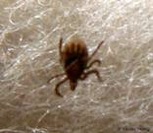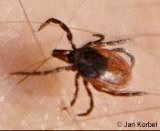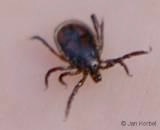TBD in South Bohemia and Bavaria

Ticks (Ixodida) are geographically widespread hematophagous acarine ectoparasites of a wide range of vertebrates. Taxonomically they belong to three families: Argasidae ("soft ticks"), Nuttalliellidae and Ixodidae ("hard ticks").
In Europe, "the sheep tick" (Ixodes ricinus) has a major health importance. I. ricinus is an exophilic tick with a three-host developmental cycle. The development takes 2-6 years depending on environmental conditions. The feeding takes 2-4 days for larvae, 3-5 days for nymphs and 6-10 day for adults. The ticks can feed on wide range of vertebrates: insectivores (shrews, moles, hedgehogs...), lagomorphs (hares), artiodactyles (wild boars, deer...), reptiles (lizzards...) and birds. Occasionally they infest human and they may transmit dangerous diseases like Lyme borreliosis or tick-borne encephalitis.



Nymphal I. ricinus tick
Female I. ricinus
Male I. ricinus
Ticks
1.10.2010
Dermacentor marginatus male

Female, male and nymphal I. ricinus tick



